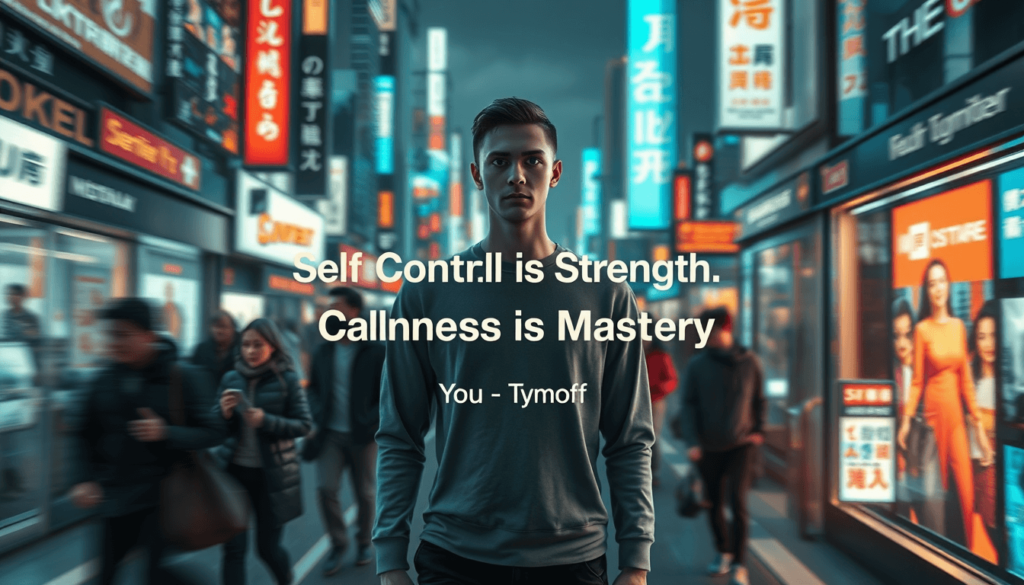Ever snapped at someone and regretted it moments later? Have you ever made a decision you wish you hadn’t because you were too angry, too anxious, or too impatient?
You’re not alone.
In a world that thrives on instant reactions and quick judgments, self-restraint and inner calm often feel like luxuries. But what if the real power lies in being unshakable, not unstoppable? That’s where the powerful quote comes in:
“Self-Control is Strength. Calmness is Mastery. You – Tymoff.”
This isn’t just another internet quote. It’s a mantra, a call to develop emotional intelligence and reclaim control over your responses, thoughts, and ultimately—your life.
What Does “Self-Control is Strength. Calmness is Mastery. You – Tymoff” Really Mean?
Let’s break it down:
- Self-Control is Strength: Your ability to resist impulsive behavior, whether it’s shouting during an argument or reaching for your phone during work, is what sets you apart. Real strength lies in restraint.
- Calmness is Mastery: Staying calm, especially in chaos, is a superpower. When you’re calm, you’re able to think clearly, act wisely, and avoid making emotionally-driven mistakes.
- You – Tymoff: This attribution reminds us that personal mastery isn’t owned by the few—it belongs to you. You are the starting point of change.
Why This Quote Resonates in Modern Life
We live in the age of overstimulation. Social media, news updates, work stress, personal struggles—it’s nonstop.
So, what’s the cost of not developing self-control and calmness?
- Burnouts
- Damaged relationships
- Regretful decisions
- Poor health outcomes
In contrast, mastering calmness and restraint allows you to:
- Build stronger connections
- Make clearer decisions
- Lead by example
- Live with peace, not regret
The Reality of Practicing Self-Control and Calmness
Let’s get real—it’s not easy. You don’t wake up one day with Buddha-like calmness. But it is doable with consistent effort and mindful practice. Self-Control is Strength. Calmness is Mastery. You – Tymoff
Here’s what that might look like:
1. Pause Before Reacting
Train yourself to pause for a few seconds before responding. This simple delay gives your brain time to switch from emotion to logic.
2. Practice Deep Breathing
Breathing techniques signal your nervous system to calm down. It takes only a minute or two to return to a neutral state.
3. Limit Triggers
Know what sets you off—whether it’s a certain topic, person, or situation—and prepare ahead of time. Awareness is your shield.
4. Journal Your Emotions
Putting your thoughts on paper can help you process feelings instead of exploding from them.
5. Set Boundaries
Say no more often. Protecting your mental peace is not selfish—it’s strategic.

The Psychology Behind Self-Control and Calmness
1. The Prefrontal Cortex Connection
This brain area controls decisions and impulses.
Strengthening it helps reduce emotional reactions.
It’s key to long-term self-control.
2. Emotional Regulation Mechanism
Calmness means managing—not avoiding—emotions.
It allows space between feeling and reaction.
This leads to wiser decisions.
3. Stress Hormones and Calmness
Calmness lowers cortisol, the stress hormone.
Less stress improves your thinking and focus.
It also boosts emotional stability.
Benefits of Practicing Self-Control in Daily Life
1. Avoid Regret-Driven Decisions
You stop acting out of impulse.
More time to think = fewer regrets.
You gain clarity and control.
2. Better Time Management
Self-discipline prevents time-wasting habits.
You stay focused and intentional.
More done with less stress.
3. More Respect in Relationships
People value calm, steady presence.
You become easier to trust.
It builds stronger emotional bonds.
4. Financial Responsibility
Self-Control is Strength. Calmness is Mastery. You – Tymoff
Self-control helps curb impulsive spending.
You make smarter financial choices.
It leads to long-term stability.
5. Healthier Lifestyle Choices
Discipline supports better eating and sleep.
You avoid short-term pleasure for long-term health.
Consistency becomes easier.
Pros and Cons of Living by This Philosophy
Pros
- Better Decision-Making: You no longer act out of emotion but through clarity and intent.
- Improved Relationships: People trust and respect those who stay calm and level-headed.
- Mental Peace: Less chaos in your mind equals a more fulfilling life.
- Professional Growth: Leaders who remain composed in a crisis often rise quickly.
Cons
- Takes Time to Develop: Emotional maturity isn’t an overnight achievement.
- Misunderstood as Weakness: Some may mistake your silence or restraint as passivity.
- Emotion Suppression Risk: Without balance, controlling emotions can turn into avoiding emotions, which isn’t healthy either.
What I Would Do Differently If I Had Learned This Earlier
If I had taken this quote seriously years ago, I would have:
- Avoided unnecessary arguments that burned bridges.
- Focused better at work instead of drowning in emotional distractions.
- Understood that walking away can be a sign of strength, not weakness.
- Replaced emotional chaos with thoughtful action.
But it’s never too late. That’s the beauty of it. The change begins the moment you choose it.
Daily Habits to Build Self-Control and Calmness
1. Morning Mindfulness Ritual
Start your day with calm energy. Deep breathing or silence works well. It sets the emotional tone.
2. Digital Detox Time
Too much screen time creates noise. Taking breaks resets your mind. Focus becomes easier.
3. Practice Saying ‘No’
Boundaries protect your peace. Saying no builds inner strength. It’s not selfish—it’s smart.
4. Scheduled Downtime
Doing nothing is also doing something. Quiet time helps you process emotions. It strengthens calmness.
5. Reflective Journaling
Write to understand, not just vent. Journaling reveals triggers and patterns. You grow from self-awareness.
Relatable Scenarios: Where This Quote Applies in Real Life
In Relationships
Instead of shouting during disagreements, take a breath and listen. Self-control stops words you can’t take back. Calmness helps you hear what’s really being said. So remember Self-Control is Strength. Calmness is Mastery. You – Tymoff
In the Workplace
Deadlines and pressure build tension. The colleague who remains calm becomes the go-to problem solver.
In Parenting
Kids test your limits daily. Remaining calm teaches them emotional regulation through your example.
In Traffic
Everyone’s in a hurry, but rage won’t make the light turn green faster. Calmness lets you get to your destination safely—and in one piece.
Frequently Asked Questions
Q: Is calmness really a strength in competitive environments?
Yes. Calmness provides a tactical edge. When others panic, you stay collected and make decisions that win in the long run.
Q: How do I develop self-control if I’ve always been impulsive?
Start small. Delay minor reactions first—like responding to a message or snacking impulsively. Over time, this control expands into more complex areas.
Q: Can being too calm make me seem indifferent?
It depends on context. Calmness doesn’t mean apathy. Pair your calm with empathy and clarity in communication to avoid being misunderstood.
How You Can Start Living by This Mindset
- Start a Mindfulness Routine: Whether it’s meditation, prayer, or deep breathing, find a stillness practice.
- Audit Your Reactions: Reflect weekly on what triggered you and how you responded.
- Use the Quote as a Reminder: Write it on a sticky note. Use it as your phone wallpaper.
- Surround Yourself With Calm People: Emotional energy is contagious. Choose calm.
Final Thoughts: You Are the Master of Your Reaction
“Self-Control is Strength. Calmness is Mastery. You – Tymoff” is more than a phrase—it’s a life philosophy.
You won’t always get it right. But every time you resist lashing out, every time you choose stillness over chaos, you’re building a better version of yourself.
You have the power. Not in domination. Not in shouting louder. But in choosing peace.
Because in the end, how you respond is the one thing no one else can control but you.
To build lasting self-control and inner peace, it also helps to adopt better daily habits—check out How to live an active and healthy life: six strategies for practical ways to support your mental and physical well-being.
